In November 2019, I conducted a Facebook poll in three different groups I’m a member of. I wanted to find out: How many Scotitsh Fold cats have OCD? Does it make a difference if they come from a real breeder?
About the Groups where I took the Poll
Group 1: I Love my Scottish Fold Cat!!: an international English-language group with ca. 4,300 members facebook.com/groups/
ilovemyscottishfoldcat/
–> Responses for 262 folded-ear cats.
Group 2: Scottish Fold & andere Samtpfötchen: A German-language group with 460 members which focuses on education
facebook.com/groups/
1380788582012154
–> Responses for 83 folded-ear cats.
Group 3: BKH – BLH Britisch Kurzhaar und Britisch Langhaar Katzen – Bärchen: Another educational German Group for British Short Hair/Long Hair cats with ca. 5,900 members, but only a small fraction with Scottish Folds, so that I was only able to a get a few valid responses from this group. –> Only 4 valid responses for folded-ear cats could be gathered here.
The Questions I asked
I wanted to know about 2 things:
- How many Folds people have or had in the past 10 years which showed signs of osteochondro-dysplasia or “OCD” and how many which did not.
OCD is the genetic condition which causes the ears to fold, and which unfortunately can also show up in other places, like in the tail or joints, causing painful arthritis. Signs could include a shortened, stiff tail, limping or a reluctance to jump.
2. Whether or not these folds had pedigree papers.
The Poll Results
Here are the overall results:
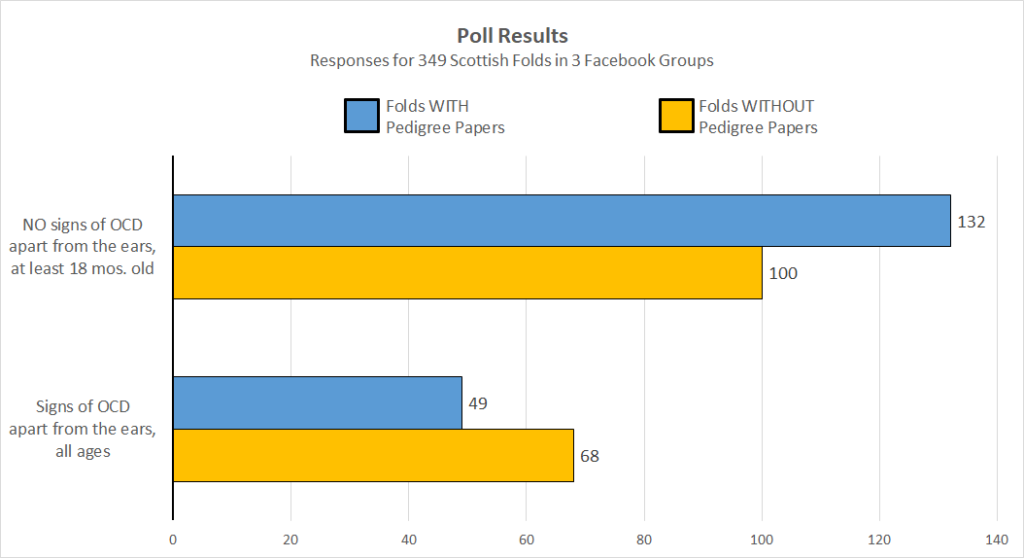
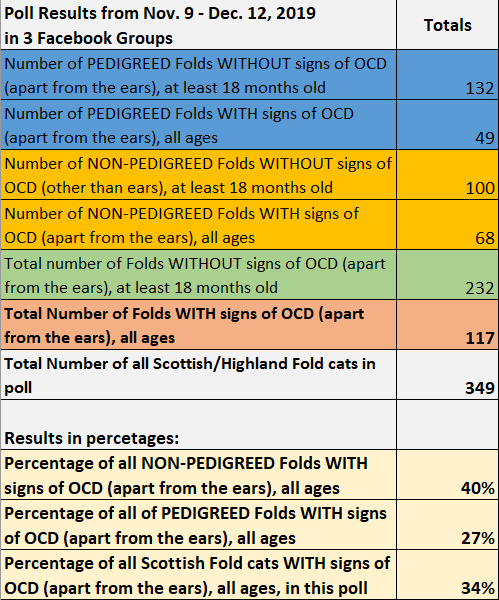
Whereas I was expecting that maybe 1 in 100 folds with pedigree papers were showing signs of OCD, and maybe 1 in 10 without papers, the results of this very informal and unscientific poll were much, much higher. I was actually pretty shocked at how many people were reporting symptoms in the English-speaking group where I had the impression that all but a few cats were healthy since we normally just posted photos and didn’t talk about health issues very much.
Why the Results are probably too high
But these poll results should be taken with more than a grain of salt – more like an entire shaker full. Here are some of the reasons that the results would be higher than in reality:
- I only allowed people to report that their folds did not have OCD if they were at least 18 months of age. This was because symptoms usually only show up when the cat is nearly fully grown. But a lot of cats show signs earlier than 18 months and these cases could be counted in the poll, which skewed the results towards more cats with OCD.
- It is very possible that more people with sick cats participate in a poll asking about health issues than people with healthy cats. It is even the case in the German-speaking Group 2 that a lot of the members only sought out a Facebook group for Scottish Folds after noticing that their cat had breed-related issues.
If it had been a more scientific poll, I would have tried to randomly select owners of Scottish Folds, whether in a Facebook group or not, and have asked them to take the survey. The problem is that I wouldn’t know where else to look for owners of Scottish Folds, if not in an online group that is geared towards this particular breed. That’s what the second German group, mainly for British Short/Long Hairs shows. Though I know that there are at least 30 Fold owners in the group, only 8 people responded and most of these answers could not be counted since it could be demonstrated in other posts that their cats were too young to be counted as not showing signs of OCD.
So even if I could have sent the questionnaire by mail to thousands and thousands of random households around the world, I would have to hope for a number of things: that some of them have cats and that a few of these – probably less than one in a thousand – would have Scottish Folds. That they would open the letter, be able to understand whatever language it was written in and that they would take the time to write back. Besides being extremely costly and time consuming, I would not be able to hope for more than a handful of responses. So a Facebook poll was the best that I could do.
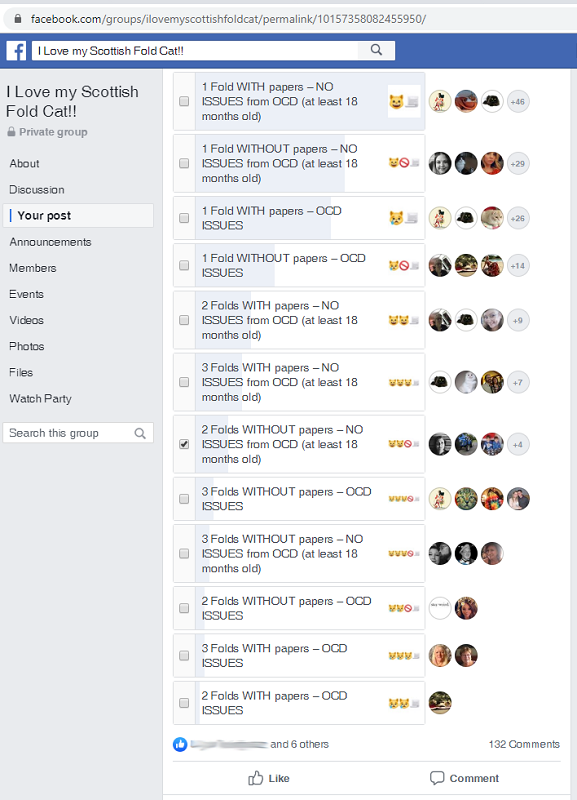
- I actually wanted to ask if the folds were from conscientious breeders who have their breeding cats x-rayed and eliminate those cats from their breeding programs who are showing abnormalities – because this to me is what might make a difference in limiting the occurrence of OCD, but it was too difficult to ask. First of all, I would have to define it: What exactly qualifies a breeder as responsible, what do they test for and how often. And did the cat’s owner really verify the tests or just take the breeder’s word for it – as if an average cat owner would even be able to evaluate an x-ray.
In the end, I might have 2 or 3 people who met all of those criteria and the rest would be categorized as possibly being from Backyard Breeders, so that the question would no longer be meaningful. So, instead, I just asked if the cat had pedigree papers or not. Anything else would have been much too complex for a Facebook poll which already had 12 possible answers and where it was possible to choose as many as applied. Especially if I then went on to explain that only pedigree papers from reputable organizations should be counted since some Backyard Breeders order documents over the Internet which are not worth the paper they’re printed on. So this means that some of the cats “with papers” showing signs of OCD really belong in the other category, since they come from breeders who did not act responsibly. - People could answer that their cats showed signs of OCD, even where the diagnosis hadn’t been confirmed by a veterinarian. It is possibly that some owners misjudged the signs and that OCD was not the cause, but these cats were counted as showing signs anyway, thus making the number of cases even higher.
Why the Poll Results still could be a good indicator
On the other hand, I only asked about OCD. Which, for me, was quite strange having to mark that I had 2 cats who didn’t show any signs even though one of my cats has hip dysplasia and a long list of joint issues, which she was also born with. But since hip dysplasia in Scottish Folds has not been linked to OCD at this time, it wasn’t fair to count her issues in the poll.
But there are other hereditary illnesses which are typical to the breed, e.g. PKD affecting the kidneys or HCM which is a serious heart condition, which I didn’t ask about. So a lot of owners who had even lost their folds to other genetically inherited conditions still had to select the answers that their cats weren’t showing signs of OCD. So, to a certain extent, the results may have evened out a bit if you were to think of them as the chances that your Fold may inherit some sort of health issue that will affect them for life.
And when you look at it that way, the numbers are really frightening: 4 in 10 cats without papers suffer from an incurable condition, which may cause them pain their whole lives, or even result in them being put down at an early age. And one in three cats with pedigree papers. These odds are worse than with Russian Roulette! ☹
So, what do we do – ban the breed???
A fair number of people think we should. And this is definitely the trend in Europe right now, where the breed has been banned in Austria and in the city of Brussels this year alone (2019) – and soon – ironically – in Scotland, too: the birthplace of the Scottish Fold. ☹ The biggest platform for free classified ads in Germany stopped allowing ads for Scottish Folds in April of 2019, on the grounds of cruelty to animals.
So it’s pretty clear that if we don’t want the whole breed to be banned, something has to be done.
I will present a number of perspectives and alternatives, as well as some personal recommendations, in the coming weeks and months here on this website, such as in the article Should Scottish Folds be banned?
What can I do?
If you are a fan of the breed and want to see improvements happen, there are a number of things you can do:
Please share a link to this website wherever you are active online, so that it will be ranked higher in search results, meaning that more people who are looking for Scottish Fold kittens will find it.
Please subscribe to the Newsletter below and like the Scottish-Fold-Kittens.info Facebook page facebook.com/
scottishfoldkittensinfo to get an alert whenever there’s a new post on the website.
And join the discussion in the two related Facebook groups:
Scottish Fold Info Community in English
facebook.com/groups/
scottishfoldinfocommunity
Scottish Fold Katzen Info Gruppe in German
facebook.com/groups/
scottishfoldinfogruppe
Because I’m convinced that together we can make a difference. 🎗
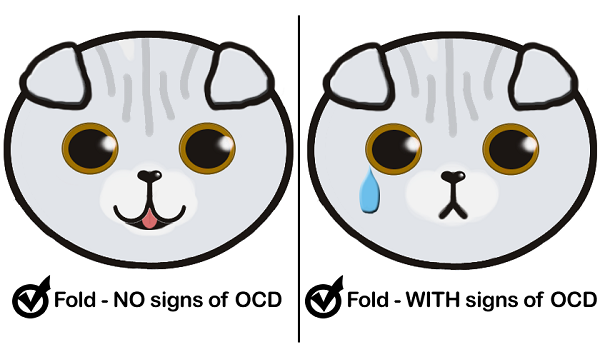

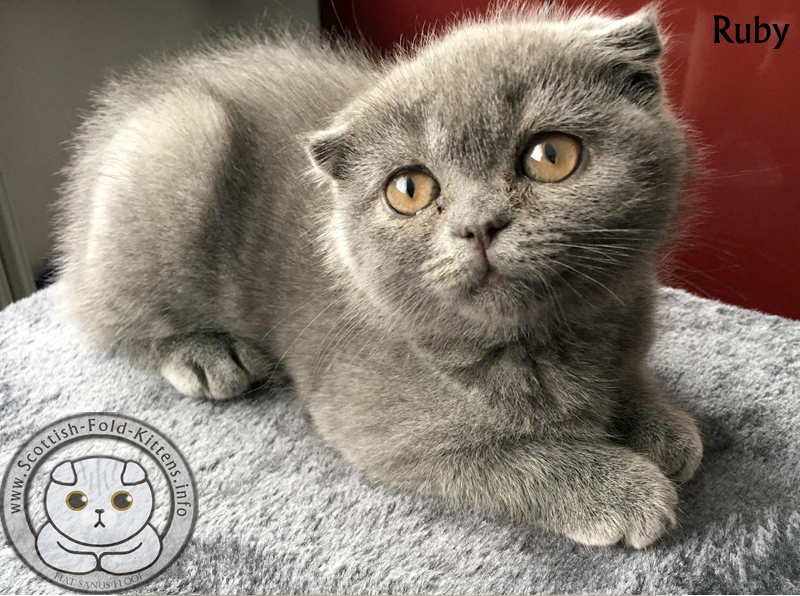
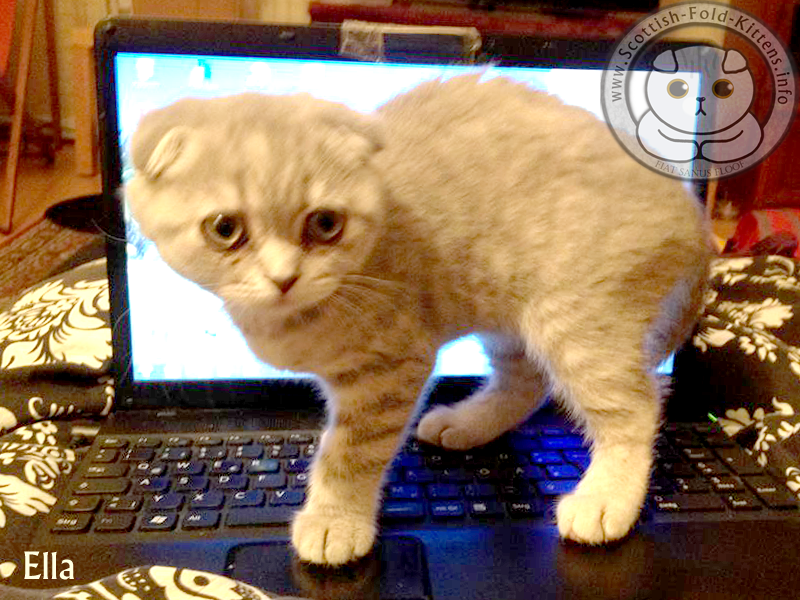
7 thoughts on “Poll Results: Scottish Folds with OCD”
Comments are closed.